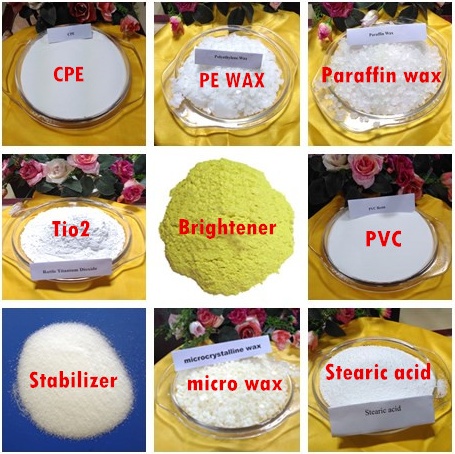Heat Stabilizer is one of the indispensable main auxiliaries for PVC processing. The number of parts used for PVC heat stabilizer is small, but its role is huge. The use of heat stabilizer in PVC processing can ensure that PVC is not easy to degrade and relatively stable. The commonly used heat stabilizers in PVC processing include basic Lead Salt Stabilizer, metal soap stabilizer, organotin stabilizer, rare earth stabilizer, epoxy compound, etc. The degradation mechanism of PVC is complex, the action mechanism of different stabilizers is different, and the stabilization effect is also different.
Pvc Stabilizer, action mechanism and application
1 Lead salt stabilizer
Lead salt stabilizers can be divided into three categories:
(1) Pure lead salt stabilizer is mostly a basic salt containing PbO;
(2) The heat stabilizer with lubricating effect is mainly the neutral and basic salt of fatty acid;
(3) Composite lead salt stabilizer, and solid and liquid composite stabilizer containing a synergistic mixture of lead salt and other stabilizers and components.
Lead salt stabilizer has strong thermal stability, good dielectric properties, and low price. The reasonable ratio of lead salt stabilizer and lubricant can widen the processing temperature range of PVC Resin, and the quality of processed and post-processed products is stable. It is the most commonly used stabilizer at present. Lead salt stabilizer is mainly used in hard products. Lead salt stabilizer has the characteristics of good heat stabilizer, excellent electrical performance and low price. However, lead salt is toxic and can not be used in products that contact with food, nor can it make transparent products, and it is easy to be contaminated by sulfide to generate black lead sulfide.
2 Metal soap stabilizer
Stearic Acid soap heat stabilizers are generally prepared by saponification of alkaline earth metals (calcium, cadmium, zinc, barium, etc.) with stearic acid, lauric acid, etc. There are many kinds of products, each with its own characteristics. Generally speaking, lubricating stearic acid is better than lauric acid, and the compatibility with PVC lauric acid is better than stearic acid.
Metal soaps can absorb HCl, and some varieties can replace the Cl atom of the active site with fatty acid radical through the catalysis of metal ions, so they can play a different degree of thermal stability on PVC. In PVC industry, there is rarely a single metal soap compound, but usually a compound of several metal soaps. The common stabilizer is calcium zinc soap. According to Frye-horst mechanism, the stability mechanism of calcium/zinc composite stabilizer can be considered as follows: first, zinc soap reacts with allyl chloride on the PVC chain, and then calcium soap, zinc soap and chlorine chloride react to form unstable metal chlorides. At this time, the auxiliary stabilizer, as the intermediate medium, transfers the chlorine atoms to the calcium soap to regenerate the zinc soap, delaying the formation of zinc chloride which can promote the dehydrochlorination.
Calcium and zinc stabilizers can be used as non-toxic stabilizers in food packaging, medical devices and drug packaging, but their stability is relatively low. When calcium stabilizers are used in large amounts, their transparency is poor and they are easy to spray frost. Calcium and zinc stabilizers generally use polyols and antioxidants to improve their performance, and transparent calcium and zinc composite stabilizers for hard pipes have appeared in China.
3 Organotin stabilizer
Alkyl tin in organotin is usually methyl, n-butyl and n-octyl. Most of the products produced in Japan are butyl tin, and octyl tin is more common in Europe. This is the standard non-toxic stabilizer approved in Europe, while methyl tin is used more in the United States.
There are three main types of organotin stabilizers commonly used:
(1) Aliphatic acid salts mainly refer to dibutyltin dilaurate, di-n-octyltin dilaurate, etc;
(2) Maleate salts mainly refer to dibutyltin maleate, bis (monobutyl maleate) dibutyltin maleate, di-n-octyltin maleate, etc;
(3) Mercaptans, of which bis (thiocarboxylic acid) ester is the most used.
Organotin heat stabilizer has good performance and is a good variety for PVC hard products and transparent products. In particular, octyltin has almost become an indispensable stabilizer for non-toxic packaging products, but its price is relatively expensive. Organic tin heat stabilizer (tin mercaptoacetate) has a good stabilizing effect on PVC. Especially the liquid organotin stabilizer can be better mixed with PVC resin than the solid heat stabilizer. The organotin stabilizer (tin mercaptoacetate) can replace the unstable Cl atoms on the polymer, making the PVC resin have long-term stability and initial color retention. The stability mechanism of tin mercaptoacetate was proposed:
(1) S atom can replace unstable Cl atom, thus inhibiting the formation of conjugated polyolefins.
(2) As a product of PVC thermal degradation, HCl can also accelerate the formation of conjugated polyolefins. Tin mercaptoacetate can absorb the HCl produced.
4 Rare earth stabilizer
Rare earth heat stabilizers mainly include organic weak acid salts and inorganic salts of light rare earth lanthanum, cerium and neodymium, which are rich in resources. The types of organic weak acid salts include rare earth stearate, rare earth fatty acid, rare earth salicylate, rare earth citrate, rare earth laurate, rare earth octanoate, etc.
The preliminary study on the action mechanism of rare earth stabilizer is as follows:
(1) The special electronic structure of rare earth lanthanide elements (2 electrons in the outermost layer and 8 electrons in the secondary layer, with many empty orbits) determines that the energy difference of their empty orbits is very small. Under the action of external thermal oxygen or polar groups, the outer or secondary outer electrons are excited, which can coordinate with the unstable Cl on the PVC chain, and can form a coordination complex with the hydrogen chloride decomposed during the processing of PVC, At the same time, there is a strong attraction between rare earth elements and chlorine elements, which can control the free chlorine element, thus preventing or delaying the automatic oxidation chain reaction of hydrogen chloride and playing a role of thermal stability.
(2) The rare-earth multifunctional stabilizer can physically absorb the oxygen in PVC processing and the ionic impurities contained in PVC itself, and enter the lattice hole of the rare-earth multifunctional stabilizer to avoid their impact and vibration on the parent C-Cl bond. Therefore, the activation energy of HCl removal from PVC can be increased by the action of rare earth multifunctional stabilizer, thus delaying the thermal degradation of PVC plastics.
(3) Suitable anion groups in rare earth compounds can replace allyl chloride atoms on PVC macromolecules, eliminate this degradation weakness, and achieve stability. There are many studies on rare earth stabilizers in China. In general, the stability effect of rare earth heat stabilizers is better than that of metal soap stabilizers. It has good long-term thermal stability, and has extensive synergistic effects with other stabilizers. It has the advantages of good tolerance, free from sulfur pollution, stable storage, non-toxic and environmental protection.
In addition, rare earth elements have a unique coupling effect with CaCo3 and promote the plasticizing effect of PVC, so the amount of CaCO3 can be increased, the use of processing aid ACR can be reduced, and the cost can be effectively reduced. The stabilizing effect of rare earth on PVC is characterized by its unique synergistic effect. The proper coordination of rare earth with some metals, ligands and co-stabilizers can greatly improve the stability.

